Food storage is a subject that can cause a lot of thought and sometimes even a lot of stress. Without modern conveniences like refrigerators and deep freezers, your food storing options are fewer, though it can still be done.
One of the most popular methods of storing food off the grid is by vacuum sealing. But what kind of food can you vacuum seal? And how long will it last?
Let’s look at some of the best food to vacuum-seal for storage purposes, as well as how long this food will last when compared to other storage methods.
Meats
As a general rule, meat should not be stored at room temperature, whether it is vacuum sealed or not.
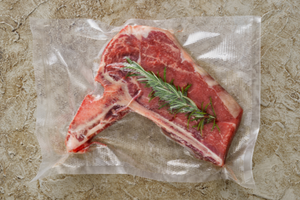
Since you will be vacuum sealing the meat with the bacteria that is already on it, there is nothing stopping the bacteria from spreading and growing.
This means that raw, uncooked meat should not be at room temperature, vacuum sealed or not, for more than two hours.
Related: 11 Meat Processing Mistakes You Are Probably Making Right Now
Even cooked meats, such as smoked, baked, or fried, are not recommended to be stored at room temperature.
However, if you are planning to vacuum seal dry, non-perishable meats such as jerky or other dried meat, you will be able to store them for up to 12 months.
If you were to just store this dried meat in a plastic bag, the shelf life would only be three weeks. Once you break the vacuum seal you will want to consume it all within a week to prevent bacteria growth.
Vegetables
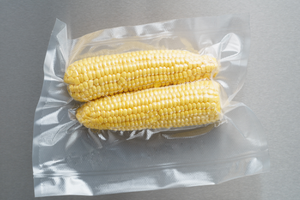 It is also recommended that most vegetables not be stored at room temperature, even when vacuum sealed.
It is also recommended that most vegetables not be stored at room temperature, even when vacuum sealed.
If you have the option to freeze your vacuum-sealed vegetables, you can extend their shelf life greatly. There are only a few vacuum sealed vegetables that will store nicely in your pantry.
Artichokes, pumpkin, and popcorn kernels are some of the vegetables that will last a long time once vacuum-sealed and properly stored.
Also, it is important to remember that root vegetables, such as onions, potatoes, and carrots, are usually stored at room temperature anyways.
If you vacuum-seal these vegetables and store them in your root cellar, you extend their shelf life from the normal 8 months to anywhere between two and three years. If you don’t have a root cellar, here’s a cheap and easy way to build a root cellar in your backyard.
Drying your vegetables before vacuum sealing them is another way to ensure that your vegetables last as long as possible.
Fruits
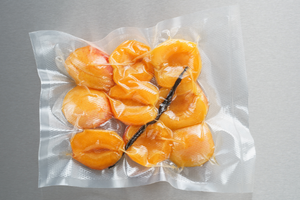 Fruits are another type of food that is usually not recommended to store at room temperature.
Fruits are another type of food that is usually not recommended to store at room temperature.
While it is usually recommended that vacuum-sealed fruits are stored in the refrigerator or the freezer, you may also be able to use your root cellar if it gets cold enough during the winter.
It is recommended to store vacuum-sealed fruits such as apricots, pears, and tomatoes somewhere between 34 and 38 degrees Fahrenheit.
Related: How To Plant Your Orchard To Have Fruits All Year Round
If you live in a cold area where this is a normal winter temperature, you will be able to make your vacuum-sealed fruits last through the winter, as opposed to the normal shelf life of a week or two.
Baked Goods
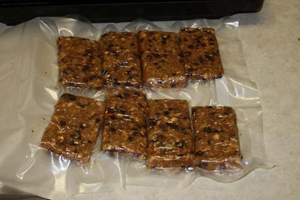 When it comes to baked goods, you can truly start utilizing your pantry and your vacuum sealer to the utmost.
When it comes to baked goods, you can truly start utilizing your pantry and your vacuum sealer to the utmost.
It is not recommended to store cookie dough in the pantry whether it is sealed or not. But there are plenty of other baked goods you can first vacuum seal and then store for a long time.
Cookies, biscuits, bagels, survival bars can have a shelf life of 2 years or more if vacuum sealed in mylar bags and stored in a cool dark place.
Coffee can be vacuum sealed and stored in the pantry for up to a year, as opposed to its normal three-month shelf life. Similarly, tea’s shelf life can be expanded from one year to two by vacuum sealing it.
Nuts are also a great option for vacuum sealing and storing in the pantry; their shelf life should go from six months to two years.
Dry Foods
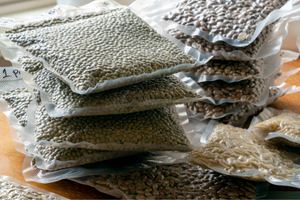 Grains are a great choice if you are looking for food to try your new vacuum sealer on.
Grains are a great choice if you are looking for food to try your new vacuum sealer on.
The normal shelf life of most grains is six months. But, after vacuum sealing those grains and ensuring that they are stored properly, you can increase their shelf life to two years.
The shelf life of rice, cereal, and pasta will go from two years to three years.
Related: How to Dry Can Beans and Rice for 20+ Years Shelf Life
Powdered milk, flour, and dried coconut are all also great options for a vacuum sealing option. The shelf life of these dry food items will go from six months to two years or more.
Spices And Herbs
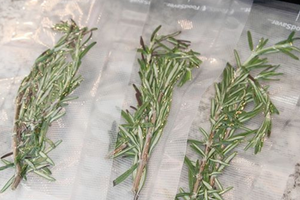 Luckily, spices and herbs are a great choice to vacuum-seal and store for long periods of time.
Luckily, spices and herbs are a great choice to vacuum-seal and store for long periods of time.
Spices and herbs can last up to two years in the pantry normally. After vacuum-sealing these spices and storing them appropriately, you can have spices to last for up to three years.
Once you break the seal on food, it should be eaten as quickly as possible. That includes all of the food that was inside the sealed package.
Also, remember that improper vacuum sealing can cause some dangerous bacteria to actually grow faster. You may want to consider using oxygen absorbers to help avoid this issue.
As you can tell, a vacuum sealer can be a very beneficial tool at your homestead. Even without refrigeration, you will be able to ensure that your food lasts for a long time.
Baked goods, dry foods, spices, and herbs are all great choices to vacuum-seal and then store. Perishable goods like fruit, vegetables, and meat should generally not be stored at room temperature.
However, if you were to dry your meat or fruit first, you could then store it in your pantry or root cellar. There is no doubt that a vacuum sealer is a great option for long-term food storage.
How To Use This Silent Weapon Of War In An Emergency
5 Ingenious Ways To Refrigerate Your Food Without Electricity (Video)
When It Comes To EMP Preparedness You Only Have Two Choices

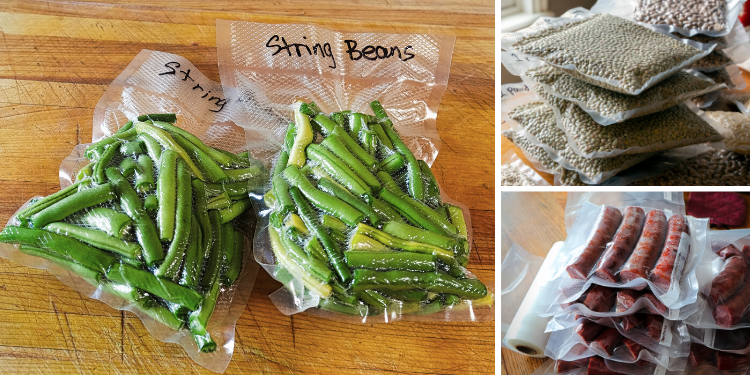
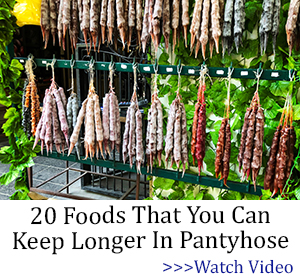













2009 I vacuumed some stuff and some lasted a little.bit and some are still vacuumed and still good to this day.
Just depends on what, I don’t know why. Some last and some don’t.
I moved most all my prep to mylar bags. Far better then seal a meal machine’s.
Good article. We need all the help we can get. Thank you…
stay sharp
total waste of time to re-package something like dry goods food like grain – the article stated storage longevity gain from 6 months to 2 years is 100% BS >>>
if you’re not going to do a proper long term storage using mylar and 02 absorbers – just leave the dry goods food in the retail store shelf poly bags – protect the bags against pest & rodents – it’s good over the 2 years boasted – more like 5 years for many of the bean varieties – rice for sure ….
the poly used for vacuum packing isn’t any different and little MIL difference than the poly bags used – it’s air permeable just like any other poly product – the machine vacuum only lasts 6 months on average >>>> eazy enough to demonstrate
use the poly & machine to fabricate an “air pillow” – set it aside with something on top to register the height >>> watch it slowly sink to a totally flat condition – lucky if it even lasts 6 months – can’t fool Mother Nature
Buddy sealed some ammo. After 2 years, it is still sealed.
He used freezer bags and double sealed all edges.
Meat and other highly perishable items can’t be run thru the sealameal and just left on the counter, no kidding!! I split up larger purchases of meat into one meal size pieces, sealameal it, and into the freezer it goes, kept below zero. I am just buying time before I lose it to freezer burn. As for it only keeping grains for 2yr, what would be the point? I have put my grain into ½ gallon jars with O2 removers and used the sealameal to pull out a lot of the air. I rate these to outlast me, if things go south I can trust them to be ok to use. If things go good my great grand kids can figure out what to do with them.
The good thing the article has done for me, I will check on some onion and bell peppers that were freeze dried and put in mylar six years ago. It has caused me to think about whether or not that was a good enough method.
Come back to let us know how the onions and peppers were?
Would be interested in knowing!
Thanks!
I am a farmer and dry clean grain storage is much longer than 2 years. I have had wheat in a grain bin (steel building) for 5 years and was just fine. Sold it to the local elevator.
However, beans, peas or other legumes have shorter times. Storage for seed use is even shorter. Germination in legumes drops very quickly in a year or to.
I vac sealed a pkg of ramen noodles, cheddar cheese grits and oatmeal in 2017. Opened in 2023 and all 3 were perfectly fine
Can’t really count the Ramen in there though. That stuff will sit for years and be just fine in the cheesy packaging it comes in. Kept in the dry, good for a very long time. Currently, i have a batch that has 2015 expiration dates, so they’re getting close to the 10 year mark from date of purchase.
So how long will freeze dried food last vacuumed sealed using an Avid Armour chamber vac, and 7mm mylar bags….either with or without o2 absorbers?
That depends on the food. In any case it will last MUCH longer than simply vacuum sealed food. Grains and other naturally long storage foods should still be good in 25 years (check with a USDA extension agent or someone else who has actual data). Freeze dried food retains about 95% of the nutrients, color and flavor of the fresh food. Of course there are a lot of variables such as the quality of the Mylar bags, storage temps, etc. 7mm bags should be good. I don’t trust the 5mm bags. There are lots of on-line resources for freeze drying and storing food. One of my go-to on-line sources is School Reports. There is a big community of home freeze drying people.
I still have some deer meat (ground, steaks, loins, ect.) that I vac-sealed & froze in 2019. Still looks, smells, cooks, & tastes like I processed it yesterday. I enjoy all the versatility that I have with my vacuum sealer. So much so, that I’m on my 3rd. one, and will buy another when this one wears out.
A lot of information that has nothing to do with vacuum sealing, and most of it is common sense. Anybody that doesn’t know you shouldn’t store meat at room temperature probably won’t make it to 30.
Herbs better be DRY before you vacuum seal them, and whole seeds and grains? They don’t benefit much from vacuum sealing at all unless you live in a really humid area. What goes bad in grains in the fats, and vacuum sealing won’t stop that.
Good golly, did somebody spin this article with an AI program and no knowledge of the topic?
Valerama, I agree with you about the article and common sense. On the subject of vacuum sealing seeds (and grains) do you think getting the oxygen away from the germ and its natural oil content will prolong its shelf life
So if I put seeds like sunflower, pumpkin, corn in oven for 15 mins on a large cookie sheet at 200 degrees would it be OK to vacuum seal
When issues seems like “common sense”, come up, I always remember when I first started out!
Not everyone reading this article is a long time prepper,
And making allowances for such statements allows the newbies to participate in the conversation.
Any person reading the article should be able to understand what it was like, being new to the program, looking for “reliable” information!
So how do you vacuum seal off grid (no electricity)
Just wondering
Fill the bag. Lower it into a large container of water, being sure not to get water in the bag. As the water comes over the level of food in the bag, seal the top. Not as good as vacuum sealing, but better than trying to ‘squeeze out excess air’.
You put the stuff in a plastic bag and push the bag under water almost to the edge.
The pressure of the water will force the air out of the bag.
as the water squeezes the air out of the bag, make the bag airtight.
It’s not as great as with a vacuum sealer but as an alternative in an off grid location it’s reasonable.
greetings from the Netherlands
You cand use a hand held car hydraulic oil vacuum pump to vac seal mason jars. U tube look at Rain Country. She shows how.
Saker jar sealer and accessory hose kit. Works with electric vacuum sealer hose or included manual pump.
I’ve vacuumed sealed many dehydrated food items through the years and had many of them stored in a freezer. Using a Tilia Food Saver, I found most of the bags lost their seal. I’ve always double sealed the bags. One regular seal, and a second one about a quarter of an inch above the first seal for cheap insurance. Just about all of the stored food items that I froze lost their seals. Food items like jerky that had hard rough edges on them were wrapped in wax paper before being sealed up so to not puncture the bag when sealed still lost their vacuum when put in the freezer. I’ve sealed up some ammo in the same bags with a desiccant inside that are in room temps year round years ago, and they’re holding their seal just fine. I do Mylar bags and 02 absorbers for food now.
One of the most useful things that I use the food saver for is using the lid sealing attachment on Mason jars. Sucking all of the air from the jars containing leftover meals and fresh fruits and vegetables greatly prolongs the freshness time in a refrigerator for several days longer than if they were in a non vacuum sealed container.
Also, with the jar sealer attachment, you could use a hand vacuum sealing tool like a manual hand brake bleeder if the power were to go out. Many of them can be bought pretty cheap (under $30.00) .
Hey I love it! Someone at the home office of this site finally deleted the insane comments of troll Ya Way Hiway.They even
got ride of my comment calling him asshole.Which he is.
Keep up the good work. It fells good to use your balls for
something other than scratching doesn’t it?
Moisture and oxygen are the two most important factors with storing food. Use of O2 absorbers and desiccant will help protect your sealed foods from moisture and oxygen so I highly recommend you use them.
I check the expiration dates of my store bought foods and when that time is getting close I dehydrate and vacuum seal it to extend the storage life.
With meat I have tried cooking, dehydrating, then vacuum sealing with mixed results. A problem with meat is the fat content. Some meat does well some not so well. Fat will go rancid even when dehydrated and vacuum sealed so the meat has a shorter shelf life that vegetables, etc.
I vacuum seal my freezer meat to decrease the odds of freezer burn. That works very well.
Most vegetables re-hydrate with little loss in texture and flavor. Two that I have found to not be as palatable after storage are carrots and broccoli. They tend to have a stronger flavor that is not always pleasant. So, I use less of either in a recipe than if they were fresh. Fruits and potatoes require a soak in a citric acid solution to avoid discoloration when dehydrating. Bananas are good when dehydrated but freeze drying works better for them.
Was wondering if raw goat milk would last longer in a vacuum mason jar?